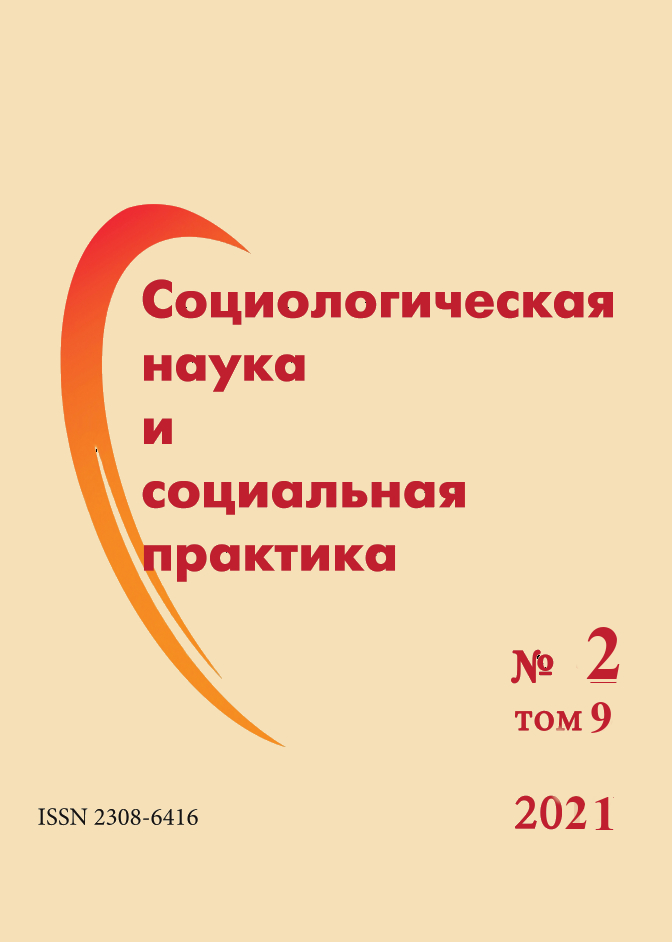Социально-экономическое положение акторов запроса на перемены
Научная статья
Аннотация
Литература
2. Волков Д., Колесников А. Мы ждём перемен – 2. Почему и как формируется спрос на радикальные изменения // Московский Центр Карнеги : [сайт]. 6 ноября 2019. URL : https:// carnegie.ru/2019/11/06/ru-pub-80273 (дата обращения: 12.02.2021).
3. Волков Д., Колесников А. Мы ждём перемен. Есть ли в России массовый спрос на изменения? // Московский Центр Карнеги : [сайт]. 25 декабря 2017. URL : https://carnegie. ru/2017/12/05/ru-pub-74906 (дата обращения: 12.02.2021).
4. Гарр Т. Р. Почему люди бунтуют. СПб. : Питер, 2005. 464 с.
5. Дмитриев М. Э., Никольская А. В. Осенний перелом в сознании россиян: мимолетный всплеск или новая тенденция? // Общественные науки и современность. 2019. № 2. С. 19–34. DOI: 10.31857/S086904990004335-0.
6. КГИ представляет доклад «Признаки изменения общественных настроений и их возможные последствия» // Комитет гражданских инициатив : [сайт]. 11.10.2018. URL : https:// komitetgi.ru/news/news/3902/ (дата обращения: 21.02.2021).
7. Латов Ю. В. Идеологические векторы и скаляры действий сторонников перемен // Социологические исследования. 2019. № 12. С. 15–28. DOI: 10.31857/S013216250007738-4.
8. Латова Н. В. Акторы запроса на институциональные перемены в современной России (социально-психологический контекст) // Journal of Institutional Studies. 2019. № 11(3). С. 119–134. DOI 10.17835/2076-6297.2019.11.3.119-134.
9. Мамонов М. В., Гаврилов И. В., Вядро М. А. Имитационные характеристики президентских выборов 2018 г. и их влияние на следующий электоральный цикл: результаты опросов общественного мнения // Мониторинг общественного мнения: Экономические и социальные перемены. 2018. № 4 (146). С. 124–147. DOI: 10.14515/monitoring.2018.4.08.
10. Медушевский А. Н. Конституция и социальный запрос на изменения в современном российском обществе // Сравнительное конституционное обозрение. 2019. № 1 (128). С. 21–41. DOI: 10.21128/1812-7126-2019-1-21-41.
11. Мерзликин Н. В., Ростовская Т. К. Неопределенность и риски российской реальности: запрос на перемены // Известия Иркутского государственного университета. Серия: Политология. Религиоведение. 2018. Т. 23. С. 71–79. DOI: 10.26516/2073-3380.2018.23.71.
12. Мчедлова М. М., Кофанова Е. Н. Россия в ожидании перемен: религиозный фактор и социально-политические предпочтения // Вестник Российского университета дружбы народов. Серия: Политология. 2020. Т. 22, № 1. С. 7–21. DOI: 10.22363/2313-1438-2020-22-1-7-21.
13. Петухов В. В. Российская молодёжь и её роль в трансформации общества // Мониторинг общественного мнения: экономические и социальные перемены. 2020. № 3 (157). С. 119—138. DOI: 10.14515/monitoring.2020.3.1621.
14. Петухов В. В., Петухов Р. В. Запрос на перемены: причины актуализации, ключевые слагаемые и потенциальные носители // Полис. Политические исследования. 2019. № 5. С. 119–133. DOI: 10.17976/jpps/2019.05.09.
15. Российское общество осенью 2018-го: тревоги и надежды / М. К. Горшков, Н. Д. Коленникова [и др.]. М. : ФНИСЦ РАН, 2019. URL: https://www.isras.ru/files/File/Doklad/ Rossiiskoe_obschestvo_osenyu_2018.pdf (дата обращения: 15.03.2021).
16. Bernburg J. G. Economic Crisis and Popular Protest in Iceland, January 2009: The Role of Perceived Economic Loss and Political Attitudes in Protest Participation and Support // Mobilization: An International Quarterly. 2015. Vol. 20(2). P. 231–252.
17. Brady H. E. An Analytical Perspective on Participatory Inequality and Income Inequality // Social Inequality / Ed. by K. M. Neckerman. New York : Russell Sage Foundation. 2004. P. 667–702.
18. Grasso M. T., Giugni M. Protest participation and economic crisis: The conditioning role of political opportunities // European Journal of Political Research. 2016. Vol. 55, № 4. P. 663–680.
19. Geschwender J. A. Explorations in the theory of social movements and revolutions // Social Forces. 1968. Vol. 47 (2). P. 127–135.
20. Gurr T. R. Why Men Rebel. Princeton (N.J.) : Princeton University Press, 1970. 407 p.
21. Kurer T., Häusermann S., Wüest B., Enggist M. Economic grievances and political protest // European Journal of Political Research. 2019. Vol. 58 (3). P. 866–892.
22. Rüdig W., Karyotis G. Who protests in Greece? Mass opposition to austerity // British Journal of Political Science. 2014. Vol. 44 (3). P. 487–513.
23. Solt F. Economic Inequality and Democratic Political Engagement // American Journal of Political Science. 2008. Vol. 52 (1). P. 48–60.
24. Von Fintel M., Ott G. Political Culture and Participation in South Africa: The Role of SocioEconomic Factors // Taiwan Journal of Democracy. 2017. Vol. 13 (1). P. 77–99.
Поступила: 30.10.2020
Опубликована: 30.06.2021








 Издатель: Федеральное государственное бюджетное учреждение науки
Издатель: Федеральное государственное бюджетное учреждение науки